
THE VOICE OF INTERNATIONAL LITHUANIA
|
VilNews has its own Google archive! Type a word in the above search box to find any article.
You can also follow us on Facebook. We have two different pages. Click to open and join.
|
Front page
Lithuania has the world’s highest suicide rate
- Posted by - (0) Comment

Latest statistics from the World Health Organization show that Lithuania again is on top when it comes to suicides – with 61,3 men 10,4 women per 100,000 inhabitants deciding to end their lives this sad way – annually.
Dainius Puras, a Lithuanian psychiatrist, explains how it is the uncertainty and unpredictability of the economic situation that have such a detrimental effect: "People don't like change,” he says, referring to Lithuania’s 20-year period of dramatic social and economic change since the fall of the Soviet Union in 1991”.
He describes the reaction to freedom in 1989: "Many people could not manage to cope with this change, with this huge societal stress . . . [they] regressed to destructive or self-destructive behaviour." The stress, he says, prompted an unprecedented crisis of mortality, one that still exists. In Lithuania, with a population of just three million, 5,000 people die every year because of "external causes" - suicide, homicide, violence. He describes it as an epidemic.
Lithuania - a prophetic microcosm of the global crisis?
Puras sees Lithuania's experience as a prophetic microcosm of the global crisis: a society undergoing enormous stress because of the effects of a toxic system, culminating in an “explosion" in the form of a financial crisis. He also points out a strange trend: the more severe the threat to human life, the better societies and individuals seem to fare in their mental health. "History shows that when it is a real crisis like war, or when people are starving, there is a huge decrease in mental health problems, including suicide. During the war you have to survive physically; existential problems are not so important. Suicide is mainly the price we pay for civilisation."
Figures for the UK support his theory - during the First World War, the suicide rate dropped to 8.5 per 100,000. It then leapt to 13.5 in the interwar years, and fell again during the Second World War to 9.2. Immediate, life-threatening crisis, Puras says, creates a sense of purpose: there's not as much time to worry about yourself.
( From an article in “New Statesman”, by Sophie Elmhirst)
Lithuanian Suicide Hotline
Youth Psychological Aid Centre -Vilnius Youth Line
Jaunimo psichologinés paramos centras
Rasu g.20, LT-11351 VILNIUS
Hotline: 8-800 2 8888
Website: jppc.lt
Hours: Mon, Tues, Wed, Thurs, Fri, Sat, Sun: 16:00 - 07:00
Suicides per 100,000 people per year
The following is a list of suicide rates by country according to data from the World Health Organization, in which a country's rank is determined by its total rate deaths officially recorded as suicides in the most recent available year, last updated in 2011.
Male and female suicide rates are out of total male population and total female population, respectively (i.e. total number of male suicides divided by total male population). The total rate of suicides is based on the total number of suicides divided by the total population rather than merely the average of the male and female suicide rates, because the gender ratio in most countries is not 1:1. Year refers to the most recent year that data was available for a particular country.
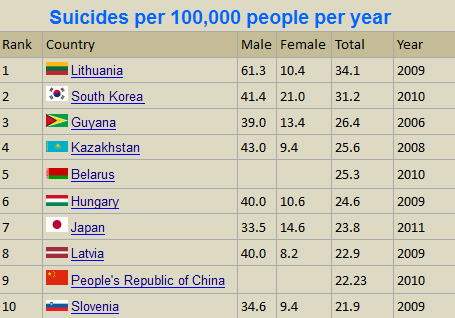
Other articles:
http://www.elnet.lt/psychoanalysis/psychoanalysis/Vilmos2.htm
http://eurpub.oxfordjournals.org/content/10/2/101.full.pdf
- Bookmark :
- Digg
- del.icio.us
- Stumbleupon
- Redit it
Preventing suicide
- Posted by - (0) Comment

If you or someone you know is living with depression or bipolar disorder (also known as manic depression), you understand all too well that the symptoms may include feelings of sadness and hopelessness. These feelings can also include thoughts of self-harm or suicide. Whether we have suicidal thoughts ourselves, or know a severely depressed person who does, there are ways that we can respond with strength and courage.
Understanding Suicidal Thinking
The most important thing to remember about suicidal thoughts is that they are symptoms of a treatable illness associated with fluctuations in the body’s and brain’s chemistry. They are not character flaws or signs of personal weakness, nor are they conditions that will just "go away" on their own. Depression and the depressive phase of bipolar disorder may cause symptoms such as the following:
- intense sadness
- hopelessness
- lethargy
- loss of appetite
- disruption of sleep
- decreased ability to perform usual tasks
- loss of interest in once-pleasurable activities
Taken together, these symptoms may lead someone to consider suicide. However, with proper treatment the majority of people do feel better and regain hope. Recovery is possible.
|
An article by the Depression and Bipolar Support Alliance (DBSA) |
- Bookmark :
- Digg
- del.icio.us
- Stumbleupon
- Redit it
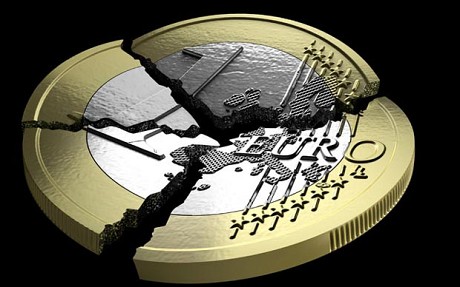
By Valdas Samonis
The current Prime Minister Andrius Kubilius Government of Lithuania adopted a very ambitious (no IMF help even sought!) and a rather very harsh austerity modeled on the reigning traditional EU thinking in order to clean the Augean stable of Lithuania’s finance wrecked by the former Soviet nomenklatura hijacked governments that largely used “easy” EU money to place their cronies in plum jobs in LT and Brussels (to the exclusion of younger generation of course), “prikhvatize” real estate and keep it from any socially beneficial taxation, etc.
The Kubilius Government’s harsh austerity policies (the so called internal devaluation) cutting public sector wages, social expenditures (by about one third) and increasing some taxes, etc, in a national fiscal belt tightening (“diet”) that has probably been the steepest in recent memory globally. Predictably, the GDP collapse was horrible at some 20%. The LT people have been pretty much resigned to the fate, in a stark contrast to Greece.
Despite repeatedly proving the nation’s responsibility and sacrifice (investment) capabilities via austerity, etc, LT did not attract much European/Western direct investment so the productivity remained at low post-communist levels at the time when emerging Asia provides a stiff global competition.
Before they realized what is going on and who was robbing them, the Lithuanian people got clabbered by this new ambitious austerity policy and the younger ones started emigrating in catastrophic numbers, seeing no future in the country whose GDP was reduced (from a low post-Soviet level) by some 20% by the combination of the old nomenklatura rent-seeking policies and the continued global Great Recession. Lithuania is hollowing out, unfortunately.
While the Lithuanians made huge sacrifices and so “invested” in the future, the Greeks have been continuing the party here and now until the last bottle or perhaps they can get another one, and another :).
In the current state of European affairs, Greeks won, Lithuanians lost!
- Bookmark :
- Digg
- del.icio.us
- Stumbleupon
- Redit it
Adomas Varnas – artist and banknote designer
- Posted by - (8) Comment

Adomas Varnas (1879-1979).
“Artist and beggar”, 1906-1908, oil on canvas, 115x80.
Čiurlionis National Art Museum
By Frank Passic, Albion, Michigan, USA
A few weeks ago in Vilnews there was an article about Lithuanian artist Adomas Varnas (1879-1979), which included an illustration of his 1953 masterpiece entitled “The Coronation of King Mindaugas.” Varnas’ lifespan far surpassed those of his counterparts, and his biography is extensive. Varnas was co-founder and the first president (1920) of the Association of Creative Artists, and helped organize Lithuanian art schools and galleries. He became well known for his collection of ethnographic material, particularly the wayside crosses. He also designed various Lithuanian stamps and banknotes.
Varnas escaped to the West during the summer of 1944, and in 1949 settled in Chicago, Illinois. Despite his old age, he remained active until the time of his death. He celebrated his upcoming 100th birthday on December 8, 1978 and was able to speak briefly at a banquet held in his honor in Chicago at the time.
In a bit of irony, the Lithuanian numismatist Dr. Aleksandras Rackus (1893-1965) wrote in 1949:
“Adomas Varnas, the famous Lithuanian artist…is coming to the U.S. He fled from the Bolsheviks in his old age and lived as a refugee in a D.P. camp in Germany. He is more than 70 years old and malnutrition made him physically weak. Stamp collectors undoubtedly will want his autograph and other favors, but they should remember that he won’t live very long, so try to reciprocate. At least buy from him a painting.”
Not only did Varnas live a long life of 100 years, he lived for more than thirty years after Rackus’ statement! Rackus died in 1965.
- Bookmark :
- Digg
- del.icio.us
- Stumbleupon
- Redit it
- Posted by - (0) Comment
Frankfurter Rundschau:
”Lukaschenko, der gnadenlose Barbar”
Lukashenko, the
ruthless barbarian
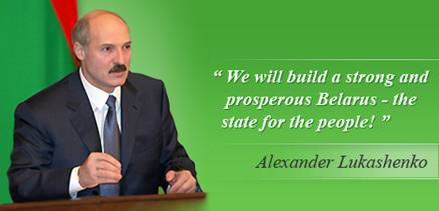
Photo/motto: http://president.gov.by/en/
German newspaper Frankfurter Rundschau calls Belarusian President Alexander Lukashenko a ruthless barbarian after the execution of two young men convicted of a bomb attack at Minsk subway’s most crowded station on April 11, 2011
"The question of whether the guilty of the convicted has been proven is not decisive. The president, who believes that the death of people can be repaid by the death of others, makes a killer of himself. Disregard for human life makes them indistinguishable,” writes the newspaper.
“In addition,” says the newspaper, “the method of the execution in Minsk - a shot in the head - is a symbol of terror in itself. For example, that was the way of killing of thousands of Stalin's victims by monstrous hangman Vasili Blokhin. The memory of this is embodied in the collective consciousness in the former Soviet space deeper than it’s portrayed in the West."

Last November, Dmitry Konovalov and Vladislav Kovalyov were convicted of a bomb attack at Minsk subway’s most crowded station on April 11, 2011, which killed 15 people and wounded hundreds of others. Last Friday they were both executed, shot in their necks.
- Bookmark :
- Digg
- del.icio.us
- Stumbleupon
- Redit it
- Posted by - (0) Comment
Michel Hazanavicius,
5 Oscar Prize winner,
is a French Litvak

The French film maker and Director Michel HAZANAVICIUS (born in Paris, 1967), who won 5 Oscars in Los Angeles recently for his black and white sillent movie, The Artist, starring Jean Desjardins and Bérénice Bejo, is of Litvak descent.
His grand-parents emigrated from Lithuania to France in the 1920s.
- Bookmark :
- Digg
- del.icio.us
- Stumbleupon
- Redit it
- Posted by - (0) Comment
UŽUPIS SPRING 2012
Slide show with music. Full screeen recommended!
Photos: Aage Myhre
Director: Cassandra Myhre
Music: Music: Sergey Kuryokhin –
Morning Exercises in the Nuthouse
Užupis is a neighbourhood located in the outskirts of Vilnius' Old Town. Užupis means "on the other side of the river" in Lithuanian language and refers to the Vilnia River. The name Vilnius was derived from the Vilnia. Užupis is popular with artists, and has been compared to Montmartre in Paris due to its bohemian atmosphere. The district houses art galleries, artists' workshops, and cafés. On April Fools Day in 1997, the district declared itself an independent republic (The Republic of Užupis), replete with an army of 12 personnel. Užupis is largely characterized by dilapidated buildings, courtyards and cobblestone streets that haven‘t been renovated for decades. But when the music reverberates over the cobbles in the late evenings you will certainly fall in love with this unique part of Vilnius. The atmosphere – filled with love, music, smells and happy people – will certainly catch your soul…
- Bookmark :
- Digg
- del.icio.us
- Stumbleupon
- Redit it
- Posted by - (0) Comment
“Give us this day our
daily harbour seal”
 The harbour seal is found along temperate and Arctic marine coastlines of the Northern Hemisphere. |
 Hans Egede (1686 – 1758) was a Norwegian missionary, known as the Apostle of Greenland. |
Many of us remember our Lord’s Prayer, or Pater Noster as many call the most outstanding prayer of Christianity. One phrase goes as follows: “Give us this day our daily bread,..” This became an ever so slight nut to crack for the North Norwegian priest Hans Egede when he came to Greenland to preach in the 1700s. The indigenous people who populated the world's largest island, the Inuits, did not know what bread was!
But the priest found a solution, and in his translation to Inuit language the phrase became therefore logically enough, "Give us this day our daily harbour seal." Because it was these seals that were the most important element of the Inuit food chain at the time...
It was Hans Egede, often called the Apostle of Greenland, who founded the town of Nuuk (Godthåb), capital of today's Greenland. His statue stands solidly on its base in the outskirts of the town.
Nuuk (Godthåb), the capital of Greenland, offers colourful architecture where the winter bites as coldest
 I sit at Kastrup Airport near Copenhagen, Denmark, an early February morning. Waiting to border the Scandinavian Airlines flight to Kangerlussuaq Airport in Greenland. Then comes the message: The flight is cancelled. Luckily I get on a plane from Greenland Air, and a couple of hours later I am sitting in a red Boeing 757 heading northwest. I have been awarded a seat between two mildly said overweight Inuits, Eskimoes as we used to call them in the past. It smells of sweat and I am unable to find room for my arms on the armrests. After four and a half hour of torment we land in the icy wilderness. The temperature outsideis -40C, inside the terminal building it is a little warmer. But not much.So I'm very happy when I finally, after several hours waiting time, get on board a red propeller plane, a Dash 7, flying me to Greenland's capital Nuuk further south on the island. The trip takes only an hour.
I sit at Kastrup Airport near Copenhagen, Denmark, an early February morning. Waiting to border the Scandinavian Airlines flight to Kangerlussuaq Airport in Greenland. Then comes the message: The flight is cancelled. Luckily I get on a plane from Greenland Air, and a couple of hours later I am sitting in a red Boeing 757 heading northwest. I have been awarded a seat between two mildly said overweight Inuits, Eskimoes as we used to call them in the past. It smells of sweat and I am unable to find room for my arms on the armrests. After four and a half hour of torment we land in the icy wilderness. The temperature outsideis -40C, inside the terminal building it is a little warmer. But not much.So I'm very happy when I finally, after several hours waiting time, get on board a red propeller plane, a Dash 7, flying me to Greenland's capital Nuuk further south on the island. The trip takes only an hour.
- Bookmark :
- Digg
- del.icio.us
- Stumbleupon
- Redit it
- Posted by - (0) Comment
Impacts of the new
Putin presidency on
U.S.-Russia relations?
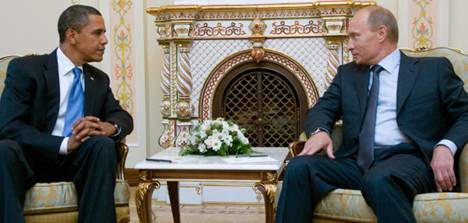
U.S. ties with Russia have been strained since Prime Minister Vladimir Putin began his re-election campaign for president. This has made it more difficult for Washington and Moscow to make progress on policy toward Syria and Iran, and we are in many fields now experiencing that the relatively warm contact between President Obama and President Medvedev is in the process of being replaced by a colder tone. Putin apparently prefers the role of counterweight more than being a world stage partner together with U.S.A.
This month marks three years since the U.S.- Russia “reset” was introduced. In March 2009, Secretary of State Hillary Clinton met with Russian Foreign Minister Sergei Lavrov in Geneva. They agreed that it was time to turn the page in relations between the two countries and start a constructive dialogue with a clean slate.
President Barack Obama has made better relations with Russia a cornerstone of his foreign policy . The so-called “reset” in relations with Russian President Dmitri Medvedev brought about a major arms-control agreement and increased cooperation on such issues as Afghanistan, Iran and Libya.
Analysts say there is currently a chill in relations between Washington and Moscow, not least due to Russia joining China in vetoing a U.N. resolution calling for Syrian president Bashar al-Assad to step aside. Secretary of State Hillary Clinton called the vote “a travesty.”
Georgetown University Russia expert Angela Stent says Vladimir Putin has been employing an old, familiar tool during his recent presidential campaign, blaming the United States for a lot of Russia’s problems..
“He has really resorted to a tactic that, of course, has been used since he became president in 2000 - and that is to invoke the United States [as the] enemy, to blame the United States for a lot of Russian problems," said Stent. "And as you saw, in the Duma elections, he then blamed Hillary Clinton, Secretary Clinton for supporting the opposition and for trying to undermine Russian stability.”
Russia expert Robert Legvold cites another example.
“When the new [U.S.] ambassador, Michael McFaul, hosted opposition figures, even though it was a quiet meeting, the authorities knew about it, had camera people there to film it," said Legvold. "And then that led the media, certainly at Putin’s behest, or media knowing what Putin would want, to sharply attack McFaul for doing this kind of thing, interfering and then accusing the opposition party of, through that channel, receiving funding from the United States.”
Mikhail Leontyev, a commentator on Russian state TV, said McFaul was close to U.S. intelligence services. Others have said McFaul has been sent to Moscow to foment an Orange Revolution in Russia.
The accusation that opposition leaders are working at the behest of the U.S. state department to generate an Orange-style revolution is an insult frequently levelled by Kremlin supporters.
"The thing is that McFaul is not a Russia specialist, but a specialist in a very specific kind of democracy promotion," Mr Leontyev said on Channel One's prime-time news programme.
Putin’s latest article, “Russia and the changing world ↑ ,” in Moskovskiye Novosti depicts the U.S. as a destabilizing and dangerous force on the world stage, which needs to be countered. Putin writes: “It seems that NATO members, especially the United States, have developed a peculiar interpretation of security that is different from ours. The Americans have become obsessed with the idea of becoming absolutely invulnerable….[this] is the root of the problem.”
In that article he rails against U.S. and NATO, alluding to the Arab Spring and support for the opposition in Syria, writing that justifications for military intervention in third-party states with the need to defend human rights is “not a noble cause,” but “elementary demagoguery.”
Given this anti-American rhetoric, questions are being raised as to what impact the new Putin presidency will have on U.S.- Russia relations.
U.S. Ambassador to Russia Michael McFaul: Introduction video
- Bookmark :
- Digg
- del.icio.us
- Stumbleupon
- Redit it
- Posted by - (0) Comment
World Lithuanians celebrating their home country!
Lithuanians all over the globe have during the past month been busy celebrating the country's national days and more. The Lithuanian spirit is alive and well in all corners
of the world!

Johannesburg, South Africa

Frackville, Pennsylvania, USA

Stockholm, Sweden
- Bookmark :
- Digg
- del.icio.us
- Stumbleupon
- Redit it
- Posted by - (0) Comment
The date 11 March will forever remain very
significant for both Japan and Lithuania
Japan mourning
2011 tsunami, Lithuania
marking 1990 freedom

A devastating earthquake and tsunami on 11 March 2011 made Japan shake to its core. Thousands of people perished. In addition to massive property damage, the Fukushima nuclear power station sustained critical damage to its reactors which, in turn, caused reactor melt downs and uncontrolled releases of radiation/radioactive materials.
11 March is a date that will forever remain significant in both Japan and Lithuania. It was on this date in 1990 that the members of the Lithuanian Parliament signed the Act of Independence, which was the first major step towards the country's liberation from the Soviet Union after 50 years of living under occupation.
And it was on this date in 2011 that a large earthquake and subsequent tsunami hit northern Japan in a most dramatic, damaging way. One of Japan's nuclear power plants was hit hard, with the result that radiation devastated a large area and many people’s lives.
Only two of Japan's 54 reactors are now running while those shut down for regular inspections undergo special tests to check their ability to withstand similar disasters.
In the midst of all this, Japan and Lithuania have signed an agreement on nuclear cooperation, as the industrial giant Hitachi has been selected to build a brand new nuclear power plant in Lithuania, expected ready by 2020. While the meltdown crisis in Fukushima has raised awareness around the world of the dangers of nuclear power, Lithuania, with its limited natural resources, appears to have little choice but to rely on atomic energy to reduce its heavy reliance on natural gas from Russia.
- Bookmark :
- Digg
- del.icio.us
- Stumbleupon
- Redit it
- Posted by - (0) Comment

Lithuania’s nuclear path

Nuclear partnership: Masaharu Hanyu, vice president and executive officer of Hitachi Ltd. (left), and Zygimantas Vaiciunas, head of Lithuania's concession tender commission and the vice minister of energy, sign a tentative concession treaty in December 2011. HITACHI LTD.
By HIROKO NAKATA
Staff writer
While the meltdown crisis in Fukushima has raised awareness around the world of the dangers of nuclear power, Lithuania, with its limited natural resources, appears to have little choice but to rely on atomic energy to reduce its heavy reliance on natural gas from Russia.
"We now import about 70 percent of electricity from other countries to Lithuania," Lithuanian Prime Minister Andrius Kubilius said in a recent interview in Tokyo. "We do not have oil resources, gas resources and coal (resources). So for us, nuclear energy is an obvious choice."
Lithuania plans to build a nuclear plant in Visaginas by 2020 and reached in December a tentative agreement on the construction with Hitachi Ltd. and its Hitachi-GE Nuclear Energy Ltd. unit.
- Bookmark :
- Digg
- del.icio.us
- Stumbleupon
- Redit it
- Posted by - (0) Comment
Growing up in a
nuclear shadow

By Kristen Iversen
I GREW up in Arvada, Colorado, in the shadow of a nuclear bomb factory, so I read the just-released report on the Fukushima meltdown in Japan with special interest. Coinciding with the first anniversary of the Fukushima Daiichi disaster, the 400-page report details the extensive misinformation supplied to the public by the Tokyo Electric Power Company (Tepco) in collusion with Japanese officials.
The Japanese government’s failure to warn citizens about radioactive danger put the entire city of Tokyo at health risk — and the rest of us as well. The report, which was written by an independent investigative panel established by the Rebuild Japan Initiative Foundation (published March 1 in the Bulletin of the Atomic Scientists), bluntly states that the much vaunted “absolute safety” of nuclear power is no more than a “twisted myth.”
The threat from nuclear power plants is twofold: grand scale catastrophe and continuing health problems connected with radioactive contamination in our air, water, soil and food supply — both short-term, high-level contamination and the long-term, low-level kind.
- Bookmark :
- Digg
- del.icio.us
- Stumbleupon
- Redit it
- Posted by - (0) Comment
Gedimino pr. Sunday 11 March at 16.00:
Let’s meet to celebrate
freedom & tolerance!

Sunday 11th of March it is 22 years since the members of the Lithuanian Parliament signed the State of Lithuania's independence declaration. At the risk of their own lives, these brave men and women put their signatures on a paper that clearly stated that they and the Lithuanian people would no longer accept to live under occupation and oppression.
Lithuania became a free and democratic country as a result of these signatures, and even if the country’s development since then has not been perfect, it is still reason to celebrate the freedom and clearly demonstrate that we value living in a free Lithuania where the concepts of tolerance, democracy, openness, respect and compassion are the ideals.
So bring your family and friends to Gedmino Avenue in Vilnius on Sunday 11 March at 16:00 and let us together celebrate unity, equality, openness and friendship. Only this kind of patriotism provides for the existence of a democratic state and civil society. Independence Day is what unites us, so let’s celebrate it together. Free, friendly and fearless!

- Bookmark :
- Digg
- del.icio.us
- Stumbleupon
- Redit it
- Posted by - (0) Comment
March 11th marks the 22nd anniversary of the historic signing of the Act of the Re-Establishment
of the State of Lithuania
There are many brave men and women to thank

Signatories celebrating in the Seimas (Parliament) the night of March 11, 1990
The signing of this Act put an end to fifty years of brutal repression and occupation by Soviet Russia.
There are many brave men and women to thank for their valiant work that ultimately made this possible.
While the members of Sąjūdis, the Lithuanian Liberty League and the signatories of the Act are often the ones we think of first we also know that it was the people of Lithuania and many Lithuanians around the world whose work and support also made this historic event happen.
We would like to share with you some of the key events leading up to and following Lithuania and Lithuanians declaring themselves once again a free and independent country and people but before we get into all the details we would just like to say something to all who made this possible March 11, 1990
AČIŪ JUMS
Su pagarbe Vincas Karnila, Associate editor
vin.karnila@VilNews.com
- Bookmark :
- Digg
- del.icio.us
- Stumbleupon
- Redit it
- Posted by - (1) Comment
International Women’s Day in Lithuania:
Valentine’s Day instead of fighting for equality…
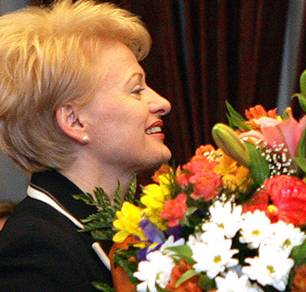
President Dalia Grybauskaitė
8th of March is International Women's Day, a day marked by women groups around the world. The day is rooted in the centuries-old struggle of women to participate in society on an equal footing with men. The idea of an International Women's Day first arose at the very beginning of the 1900s.
But in Lithuania the 8th of March is not at all characterized by women's struggle for emancipation and equality, or any sort of fighting against violence and abuse. Believe it or not, but here you will experience no single parade, no placates with demanding lines for equal rights, or any stirring speeches from women's rights activists.
The Soviet leaders were probably very anxious that the Women's Day could turn into a demonstration against the system and the many elderly, grey haired men at the top of the Kremlin. These men's smart move was to instead make the 8th of March a feast day, something in between Mother's Day and St. Valentine’s Day.
So, even today, two decades after the Soviet collapse, the 8th of March in Lithuania is the day when women receive presents, flowers, poems, text messages and lots of kind words and wishes from their men or lovers. While the 8th of March over the rest of the world makes the important point that this is a day for equality and justice between the genders, this is in Lithuania a day of romance and sweet music – a day when people celebrate more the difference than the equality between the genders.
- Bookmark :
- Digg
- del.icio.us
- Stumbleupon
- Redit it
VilNews e-magazine is published in Vilnius, Lithuania. Editor-in-Chief: Mr. Aage Myhre. Inquires to the editors: editor@VilNews.com.
Code of Ethics: See Section 2 – about VilNews. VilNews is not responsible for content on external links/web pages.
HOW TO ADVERTISE IN VILNEWS.
All content is copyrighted © 2011. UAB ‘VilNews’.

 Click on the buttons to open and read each of VilNews' 18 sub-sections
Click on the buttons to open and read each of VilNews' 18 sub-sections 















.jpg)



